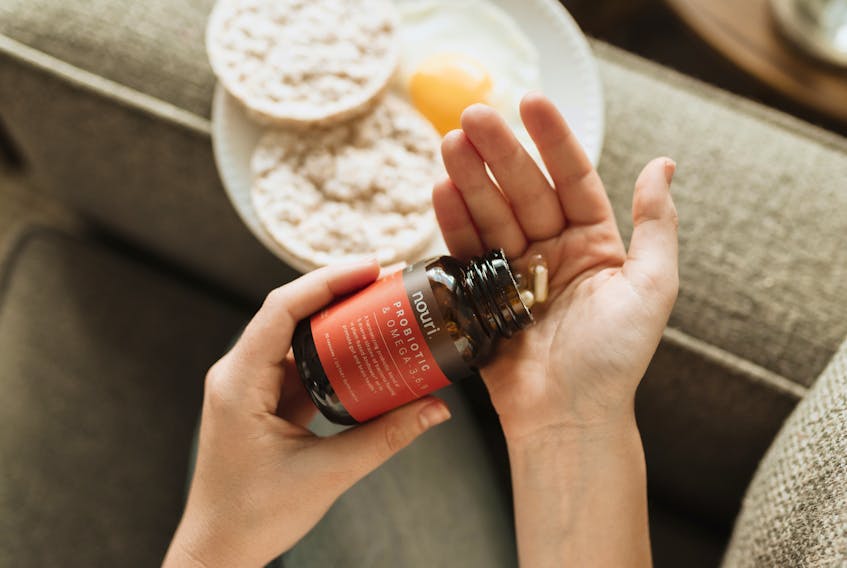It happens often. Folks trying to get their health under control go see Dr. Kathleen Mercer and dump hundreds of dollars’ worth of vitamins and supplements on her desk.
But only about $20 worth of those pills, powders or gummies are actually a valuable purchase, said the naturopathic doctor who practises at the Winterholme Wellness Center and Spa in St. John’s, N.L.
While certain people do require supplementation, Mercer sees a lot of people who are throwing money into products, while ignoring the foundations of health. That’s not the most beneficial, or cost-effective, approach to feeling our best.
“Our first foundations of health are in things that are relatively free and that we are doing anyway,” she said. “It’s about good quality sleep, good quality food, decreasing stress, getting some exercise and getting outside. Those are the foundations of health and taking nutritional supplements are in addition to that.”

Dr. Tanya O’Brien, also a naturopathic doctor at Winterholme and co-owner of 2 Naturopathic Moms, believes a lot of misinformation about vitamins and supplements lurks on the Internet and social media.
The problem: not all influencers who tout the benefits of certain products are educated in areas like nutrition, medicine and herbs or in how supplements could interact with each other or other medications.
“They’re on TikTok giving their advice and some of that advice might be OK, but there’s no such thing as a blanket statement,” said O’Brien.
Listening to these blanket statements could lead to overspending on benign products, or more serious health risks.
Take collagen, for example. The human body naturally produces the protein responsible for skin elasticity. As we age, its presence declines, which can lead to older-looking skin and joint pain.
As a supplement, the protein has spiked in popularity in recent years.
According to Global Market Insights, the collagen market was worth more than $4 billion in 2022.
But the perks — stronger nails, firmer skin, joint health — all depend on consuming the right type of collagen, explained O’Brien.
“If you’re getting it from grass-fed beef, it actually has anti-inflammatory properties,” she said.
“Whereas, if you’re getting collagen coming from a pig that is eating whatever they want, or a cow that is not grass-fed, the amino acid composition of that protein is different. And that can be more pro-inflammatory.”
While no formula fits all, Mercer said certain vitamins and supplements could benefit folks living in the often cold and damp Atlantic provinces, including an essential fatty acid, vitamin C, fibre and vitamin D.
“However, working with a professional to address individual needs is the best idea,” she said.
Finding the right information for you
The number of patients who get their health information from social media always shocks Dr. Mary Sco., a family medicine resident at Women’s College Hospital in Toronto with a Ph.D. in nutritional sciences.
“It’s amazing how influential social media is,” she said. “Sometimes, that can be a good thing and, sometimes, it can be a problematic thing.
Generally, Sco. doesn’t recommend supplements unless a patient follows a specific diet, like the vegan diet, or takes a medication that minimizes the absorption of a particular nutrient.
“Supplements are often viewed as an insurance policy,” she said, like multivitamins.

Multivitamins aren’t the most efficient way to replace precisely what a patient lacks, since they contain “a little bit of everything, which may or may not meet what one actually requires,” she said.
She’s also not a fan of collagen supplements. Amino acids are the building blocks of collagen that you can get from many sources of protein.
“(When you take a supplement,) you’re going to digest the collagen and it’s going to look no different than other sources look when they’re floating around in the bloodstream,” explained Sco.
However, she always recommends vitamin D.
Research shows that vitamin D decreases the risk of upper respiratory tract infections, chronic musculoskeletal pain, the number of asthma exacerbations in kids, the severity of eczema and, if taken during pregnancy, the risk of wheezing in newborns.
“Research has shown that, if you take vitamin D, it decreases your risk of death from any cause,” noted Sco. “It’s kind of good for everything.”
But it’s nearly impossible to get the vitamin — created in the skin when exposed to sunlight — through food and sun exposure has gotten more difficult since humans are now (usually) fully clothed when outside and living in cities that block out the sun.
“On top that, we, as physicians, tell people, when you’re in the sun, you should be wearing sunblock, which also stops you from making vitamin D,” she added. “This is why we find ourselves in this predicament.”
Enter, the vitamin D supplement.
Even so, O’Brien cautions that a too-high dose can be toxic.
Beyond this, Sco. Said, before recommending anything, she discusses health goals and lifestyle with her patients to determine if their needs can be addressed through areas like nutrition, sleep or exercise.
Mercer and O’Brien take a similar approach.
A client’s first visit lasts an hour and a half, during which they can do a full health assessment and determine nutritional needs. If a client lacks vitamins, minerals or nutrients, they create a course of action for supplements.
“We’ll also be picky about the time of day and what they take it with and how much to take, depending on each individual,” said Mercer.
So, once a professional determines the need for a supplement, how do we find the right product? O’Brien said to beware of fillers, additives and untested products.
“[Fish oil] can actually have heavy metals, which can make you sicker,” she said. “It can actually have more cholesterol in it, which can make you sicker.”
Mercer agreed, noting that, when buying fish oil, the bottle or the company’s website should clearly state that the product has been tested for toxins and heavy metals.
For other products, O’Brien said to make sure that the company has been around for a while and that their products are third party-tested.









